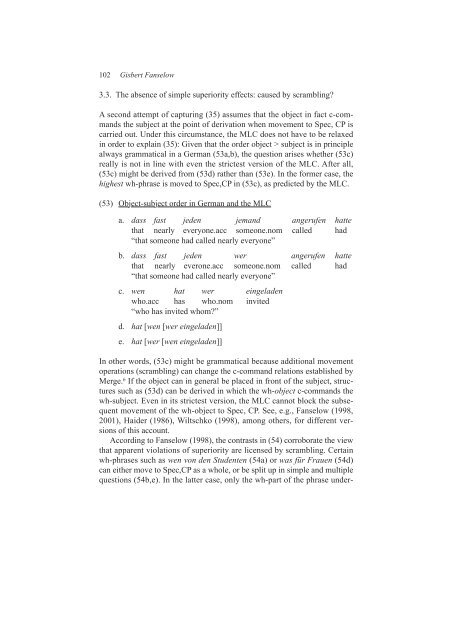Minimality Effects in Syntax · The MLC and Derivational Economy ...
Minimality Effects in Syntax · The MLC and Derivational Economy ...
Minimality Effects in Syntax · The MLC and Derivational Economy ...
Create successful ePaper yourself
Turn your PDF publications into a flip-book with our unique Google optimized e-Paper software.
102 Gisbert Fanselow<br />
3.3. <strong>The</strong> absence of simple superiority effects: caused by scrambl<strong>in</strong>g?<br />
A second attempt of captur<strong>in</strong>g (35) assumes that the object <strong>in</strong> fact c-comm<strong>and</strong>s<br />
the subject at the po<strong>in</strong>t of derivation when movement to Spec, CP is<br />
carried out. Under this circumstance, the <strong>MLC</strong> does not have to be relaxed<br />
<strong>in</strong> order to expla<strong>in</strong> (35): Given that the order object > subject is <strong>in</strong> pr<strong>in</strong>ciple<br />
always grammatical <strong>in</strong> a German (53a,b), the question arises whether (53c)<br />
really is not <strong>in</strong> l<strong>in</strong>e with even the strictest version of the <strong>MLC</strong>. After all,<br />
(53c) might be derived from (53d) rather than (53e). In the former case, the<br />
highest wh-phrase is moved to Spec,CP <strong>in</strong> (53c), as predicted by the <strong>MLC</strong>.<br />
(53) Object-subject order <strong>in</strong> German <strong>and</strong> the <strong>MLC</strong><br />
a. dass fast jeden jem<strong>and</strong> angerufen hatte<br />
that nearly everyone.acc someone.nom called had<br />
“that someone had called nearly everyone”<br />
b. dass fast jeden wer angerufen hatte<br />
that nearly everone.acc someone.nom called had<br />
“that someone had called nearly everyone”<br />
c. wen hat wer e<strong>in</strong>geladen<br />
who.acc has who.nom <strong>in</strong>vited<br />
“who has <strong>in</strong>vited whom?”<br />
d. hat [wen [wer e<strong>in</strong>geladen]]<br />
e. hat [wer [wen e<strong>in</strong>geladen]]<br />
In other words, (53c) might be grammatical because additional movement<br />
operations (scrambl<strong>in</strong>g) can change the c-comm<strong>and</strong> relations established by<br />
Merge. 6 If the object can <strong>in</strong> general be placed <strong>in</strong> front of the subject, structures<br />
such as (53d) can be derived <strong>in</strong> which the wh-object c-comm<strong>and</strong>s the<br />
wh-subject. Even <strong>in</strong> its strictest version, the <strong>MLC</strong> cannot block the subsequent<br />
movement of the wh-object to Spec, CP. See, e.g., Fanselow (1998,<br />
2001), Haider (1986), Wiltschko (1998), among others, for different versions<br />
of this account.<br />
Accord<strong>in</strong>g to Fanselow (1998), the contrasts <strong>in</strong> (54) corroborate the view<br />
that apparent violations of superiority are licensed by scrambl<strong>in</strong>g. Certa<strong>in</strong><br />
wh-phrases such as wen von den Studenten (54a) or was für Frauen (54d)<br />
can either move to Spec,CP as a whole, or be split up <strong>in</strong> simple <strong>and</strong> multiple<br />
questions (54b,e). In the latter case, only the wh-part of the phrase under-
















